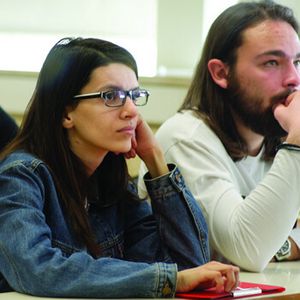PROFILE
The MSc "Religious Studies and Intercultural Research" focuses on the interdisciplinary development of Religious Studies and Intercultural Research, with emphasis on:
a) the history, theology, and institutions of religions,
b) religious culture in relation to intercultural education,
c) the interdisciplinary approach to religious studies and the social sciences, and
d) the triptych of leadership, law, and economics in church administration.
The program leverages the scientific expertise and research tradition of the Department of Social Theology and Religious Studies, offering a structured academic environment that combines theological and religious studies with interdisciplinary research.
Through the academic collaborations of the Department, the program contributes to the development of religious and intercultural studies in the Greek academic space, responding to international developments in the field. The increasing international interaction and interdisciplinary approach promoted by leading universities and research centers highlight the importance of studying religions, theological traditions, and the modern challenges they face. The integration of the MSc into this framework enhances the international presence of the National and Kapodistrian University of Athens and broadens the prospects for academic research and dialogue.
The aim of the MSc is to provide high-level postgraduate education and specialization in all academic fields covered by Theology and Religious Studies. The program’s epistemological structure responds to the fundamental requirements of academic research and the transformations of social reality.
The MSc aims to:
a) develop research and analytical skills, focusing on connecting religious traditions with contemporary socio-political dynamics, processes of intercultural dialogue, scientific methods of studying religious issues, and applications of religious knowledge in complex cultural and social environments, and
b) broaden the professional prospects of graduates, ensuring both in-depth specialization and enhancement of interdisciplinary skills. The knowledge and skills acquired will allow graduates to work in a wide range of professional fields in the modern labor market.
Specifically, graduates will be scientifically equipped to work:
In public administration and international organizations: As specialist scientists, analysts, or consultants in government agencies, public enterprises, international organizations, NGOs, and transnational centers for the analysis of political and social issues.
In religious organizations: Taking key positions requiring specialized knowledge of religious, cultural, and social issues in religious organizations, church institutions, and legal entities of a religious nature.
In mass media and communication: As journalists, analysts of international relations and political developments, columnists, and producers of scientific and cultural programs specializing in issues of religious and intercultural interest.
In religious cultural heritage management: Engaged in the management and utilization of religious monuments, archives, museums, and cultural routes, either through public bodies or private initiatives, in the context of preserving and highlighting religious cultural heritage.
In education and research: As educators, university researchers, instructors in lifelong learning centers and training institutions, particularly in environments and institutions of intercultural education.
In international relations and diplomacy: In embassies, international organizations, institutes of foreign policy, and diplomatic missions.
In the field of political strategy and analysis: As political analysts, political communication consultants, and strategy advisors in political research institutions and foundations.
In tourism and cultural travel: As cultural managers, tour guides specialized in religious and cultural tourism, and in organizations for the development and promotion of cultural routes.
In justice and social welfare: As specialists in issues of religious freedom, human rights, social cohesion, and intercultural mediation.
